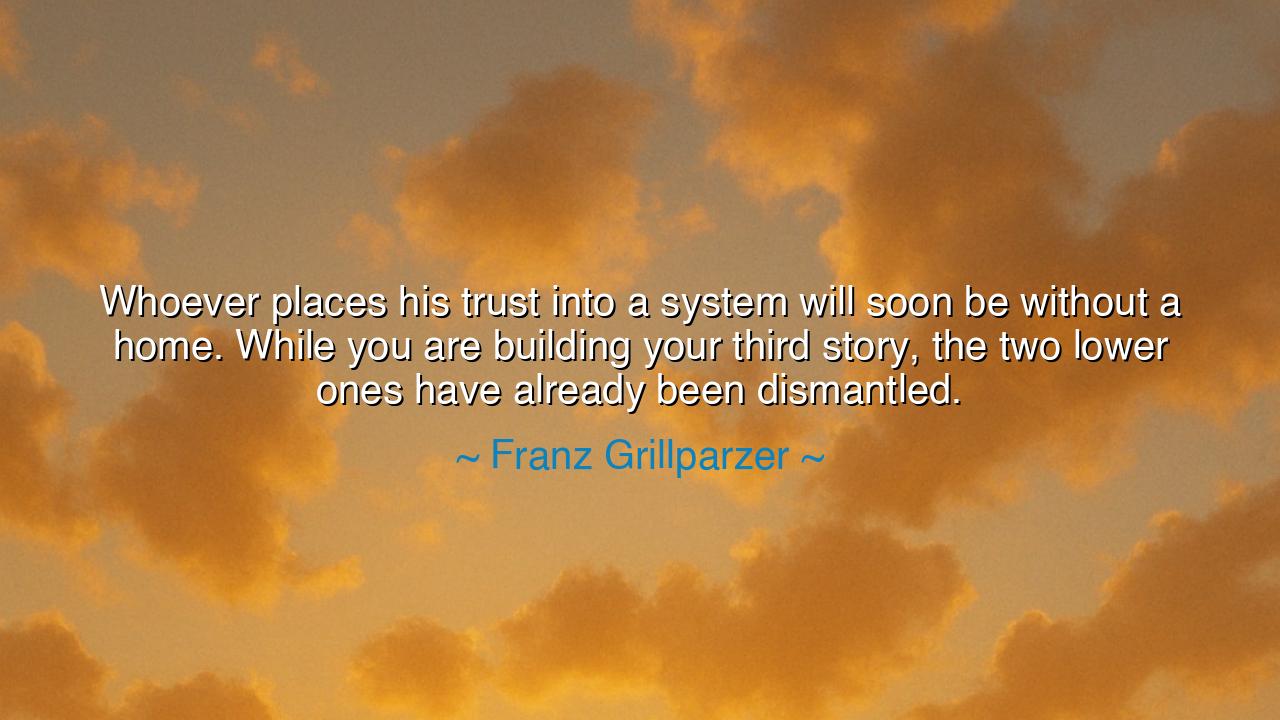
Whoever places his trust into a system will soon be without a
Whoever places his trust into a system will soon be without a home. While you are building your third story, the two lower ones have already been dismantled.






In the words of Franz Grillparzer, “Whoever places his trust into a system will soon be without a home. While you are building your third story, the two lower ones have already been dismantled.” This utterance is not the complaint of a cynic, but the warning of a prophet. It tells us that structures made by man—political systems, economic machines, even grand institutions—are not eternal. They shift, they erode, they betray those who lean too heavily upon them. To put your full trust in them is to build your house upon sand, for while you labor upward, the foundation beneath you may already be crumbling.
At its core, this quote reminds us of the impermanence of human systems. They appear mighty and enduring, with their laws, their hierarchies, their traditions. Yet history shows they are fragile, prone to corruption, and destined to fall. The man who entrusts his security to them alone may rise high for a time, but one morning he awakens to find his foundation gone. His palace becomes a ruin, and he, once proud, stands homeless. Grillparzer calls us to remember that no structure of men can be the source of ultimate trust.
The ruins of history testify to this truth. Consider the collapse of the Soviet Union. For decades, millions of people placed their trust in the system, believing it would feed them, shelter them, give them purpose. Yet while they built their lives upon its promises, the foundation was already rotting—bureaucracy suffocating the spirit, corruption gnawing at the roots, truth buried beneath propaganda. Then, almost overnight, the walls fell. Families who had relied on it stood adrift, their home dismantled before their eyes. What seemed eternal proved fleeting.
Even in the ancient world, Rome itself teaches this lesson. Citizens trusted the empire’s might, believing its legions and laws would endure forever. Yet while emperors built their marble palaces, the lower foundations—virtue, discipline, unity—were being dismantled by greed, decay, and division. And so, when the barbarians came, Rome, which had seemed invincible, was found hollow within. The citizens who trusted only in Rome’s system were left wandering, bereft of the home they thought eternal.
The meaning of Grillparzer’s words is thus both practical and spiritual. Practically, they caution us never to place blind faith in systems of government, wealth, or status. Spiritually, they remind us that only values, virtues, and the strength of the human spirit endure. Systems may crumble, but courage remains. Structures may fail, but love and wisdom endure. To build upon these is to have a home no storm can destroy.
The lesson, therefore, is this: do not be seduced by appearances of permanence. Work within systems, yes, but do not let them hold your ultimate trust. Build your foundation not upon shifting institutions but upon principles—honor, justice, truth, compassion. These are the stones that do not rot. These are the lower stories that remain even if the upper chambers fall away.
In your own life, this means vigilance. Do not let your sense of worth depend upon fragile structures. If your wealth vanishes, if your company collapses, if your nation falters—stand firm in the inner home you have built through character. Guard your foundation daily, even as you build higher dreams. For a man who tends only to the tower above but forgets the stones beneath will one day see his whole house fall.
Thus Grillparzer’s words echo like a warning bell across the ages: systems may rise and fall, but the spirit must remain steadfast. Trust not in the scaffolding of men, but in the eternal values that cannot be dismantled. Build your home upon these, and though the world’s systems collapse, you will remain standing, with a dwelling secure in the realm of truth.






QDNguyen Quang Dung
I find this quote thought-provoking because it challenges the idea of building a solid foundation on something that is inherently unstable. Grillparzer seems to be cautioning against the illusion of security within systems that are in constant flux. How do we create something sustainable in a world where systems, whether social or personal, seem to be always changing or being dismantled? How do we adapt to keep our sense of stability intact while recognizing the impermanence of everything?
YNmai thi yen nhi
Grillparzer’s words make me think about how we often build our lives or careers based on certain systems or ideals, only to find that those systems are not as reliable as we thought. It’s a cautionary reminder to not place all your bets on something that may change or collapse unexpectedly. How do we guard ourselves against the vulnerability of placing too much trust in institutions or structures that are constantly evolving or breaking down?
THThanh hang
This quote resonates with the idea of impermanence and the danger of putting all your trust in one structure. It seems like Grillparzer is warning against overconfidence in what might seem like a solid foundation, only to find that things are already falling apart beneath us. Could this be a critique of modern systems that promise security, yet constantly face upheaval? How do we find balance between stability and adaptability in our personal and professional lives?
THLe Thanh Hang
Franz Grillparzer’s quote seems to highlight the fleeting nature of stability in systems. It suggests that if you put all your faith in a single structure, it may crumble before you can even enjoy its supposed benefits. How much of our trust do we place in systems, whether social, political, or economic, that seem stable but are ultimately fragile? Is it possible to truly build something lasting in a world where everything is subject to change?